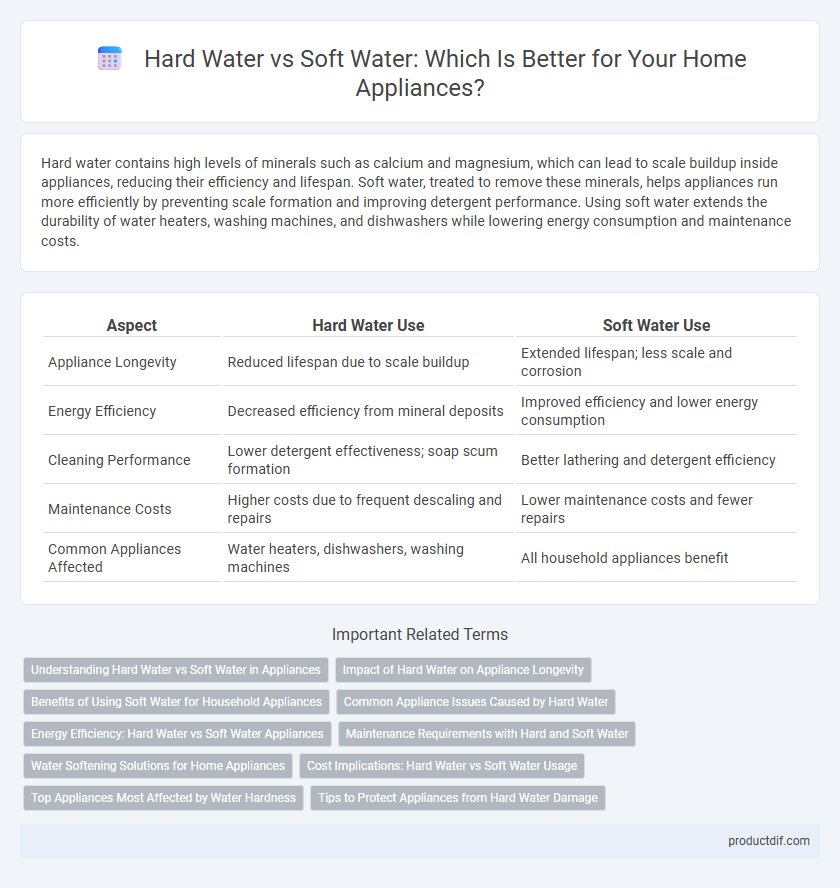Hard water contains high levels of minerals such as calcium and magnesium, which can lead to scale buildup inside appliances, reducing their efficiency and lifespan. Soft water, treated to remove these minerals, helps appliances run more efficiently by preventing scale formation and improving detergent performance. Using soft water extends the durability of water heaters, washing machines, and dishwashers while lowering energy consumption and maintenance costs.
Table of Comparison
| Aspect | Hard Water Use | Soft Water Use |
|---|---|---|
| Appliance Longevity | Reduced lifespan due to scale buildup | Extended lifespan; less scale and corrosion |
| Energy Efficiency | Decreased efficiency from mineral deposits | Improved efficiency and lower energy consumption |
| Cleaning Performance | Lower detergent effectiveness; soap scum formation | Better lathering and detergent efficiency |
| Maintenance Costs | Higher costs due to frequent descaling and repairs | Lower maintenance costs and fewer repairs |
| Common Appliances Affected | Water heaters, dishwashers, washing machines | All household appliances benefit |
Understanding Hard Water vs Soft Water in Appliances
Hard water contains high levels of minerals such as calcium and magnesium, which can lead to scale buildup in appliances like washing machines, dishwashers, and water heaters, reducing their efficiency and lifespan. Soft water, treated through ion exchange or other methods, minimizes mineral deposits, preventing corrosion and improving appliance performance. Understanding the impact of water hardness on appliances helps in selecting appropriate water treatment solutions to enhance durability and operational efficiency.
Impact of Hard Water on Appliance Longevity
Hard water significantly reduces appliance longevity by causing mineral buildup and scale inside water heaters, washing machines, and dishwashers, leading to inefficient operation and increased energy consumption. The calcium and magnesium deposits obstruct water flow and strain internal components, accelerating wear and tear on heating elements and pumps. Using soft water prevents scale formation, extending appliance lifespan and reducing maintenance costs by improving overall efficiency.
Benefits of Using Soft Water for Household Appliances
Soft water significantly extends the lifespan of household appliances by preventing scale buildup caused by minerals like calcium and magnesium found in hard water. This mineral-free water enhances the efficiency of appliances such as washing machines, dishwashers, and water heaters, reducing energy consumption and maintenance costs. Soft water also improves detergent performance, resulting in cleaner clothes and dishes while minimizing soap scum and residue.
Common Appliance Issues Caused by Hard Water
Hard water causes mineral buildup, particularly calcium and magnesium deposits, leading to clogged pipes and reduced appliance efficiency. Washing machines and dishwashers often experience scale buildup, resulting in poor cleaning performance and increased energy consumption. Water heaters suffer from sediment accumulation, which reduces heating efficiency and shortens appliance lifespan.
Energy Efficiency: Hard Water vs Soft Water Appliances
Appliances using soft water demonstrate higher energy efficiency due to reduced scale buildup on heating elements, allowing optimal heat transfer and less energy consumption. Hard water appliances often experience mineral deposits that increase energy usage by up to 25% and shorten appliance lifespan. Regular use of water softeners enhances appliance performance and lowers electricity bills by maintaining cleaner internal components.
Maintenance Requirements with Hard and Soft Water
Hard water causes mineral buildup and scale deposits in appliances, leading to increased maintenance needs such as frequent descaling and filter replacement. Soft water, with reduced calcium and magnesium content, minimizes scale formation and extends appliance lifespan by lowering wear and tear on heating elements. Regular use of soft water lowers maintenance costs and improves appliance efficiency in dishwashers, washing machines, and water heaters.
Water Softening Solutions for Home Appliances
Hard water contains high levels of minerals like calcium and magnesium, leading to scale buildup that reduces the efficiency and lifespan of home appliances such as washing machines and dishwashers. Water softening solutions use ion exchange technology to replace these minerals with sodium or potassium ions, preventing scale formation and improving appliance performance. Installing a water softener enhances appliance durability, reduces energy consumption, and lowers maintenance costs over time.
Cost Implications: Hard Water vs Soft Water Usage
Hard water causes mineral buildup in appliances, leading to increased energy consumption and frequent repairs, which significantly raise maintenance costs. Soft water prevents scale formation, extending appliance lifespan and reducing the need for detergent and energy use, resulting in lower operational expenses. Investing in water softening systems can offset initial installation fees by decreasing long-term appliance repair and replacement costs.
Top Appliances Most Affected by Water Hardness
Hard water significantly impacts appliances such as washing machines, dishwashers, and water heaters by causing scale buildup that reduces efficiency and lifespan. Soft water helps prevent mineral deposits, improving appliance performance and reducing maintenance costs. Utilizing water softeners can enhance the durability and energy efficiency of these top appliances most affected by water hardness.
Tips to Protect Appliances from Hard Water Damage
Hard water causes mineral buildup in appliances, reducing efficiency and lifespan; using water softeners or installing descaling systems prevents scale formation. Regularly flushing appliances like washing machines and dishwashers with vinegar or commercial descalers removes deposits and maintains optimal performance. Opting for soft water minimizes corrosion and energy consumption, safeguarding appliances and lowering maintenance costs.
Hard water use vs Soft water use Infographic

 productdif.com
productdif.com